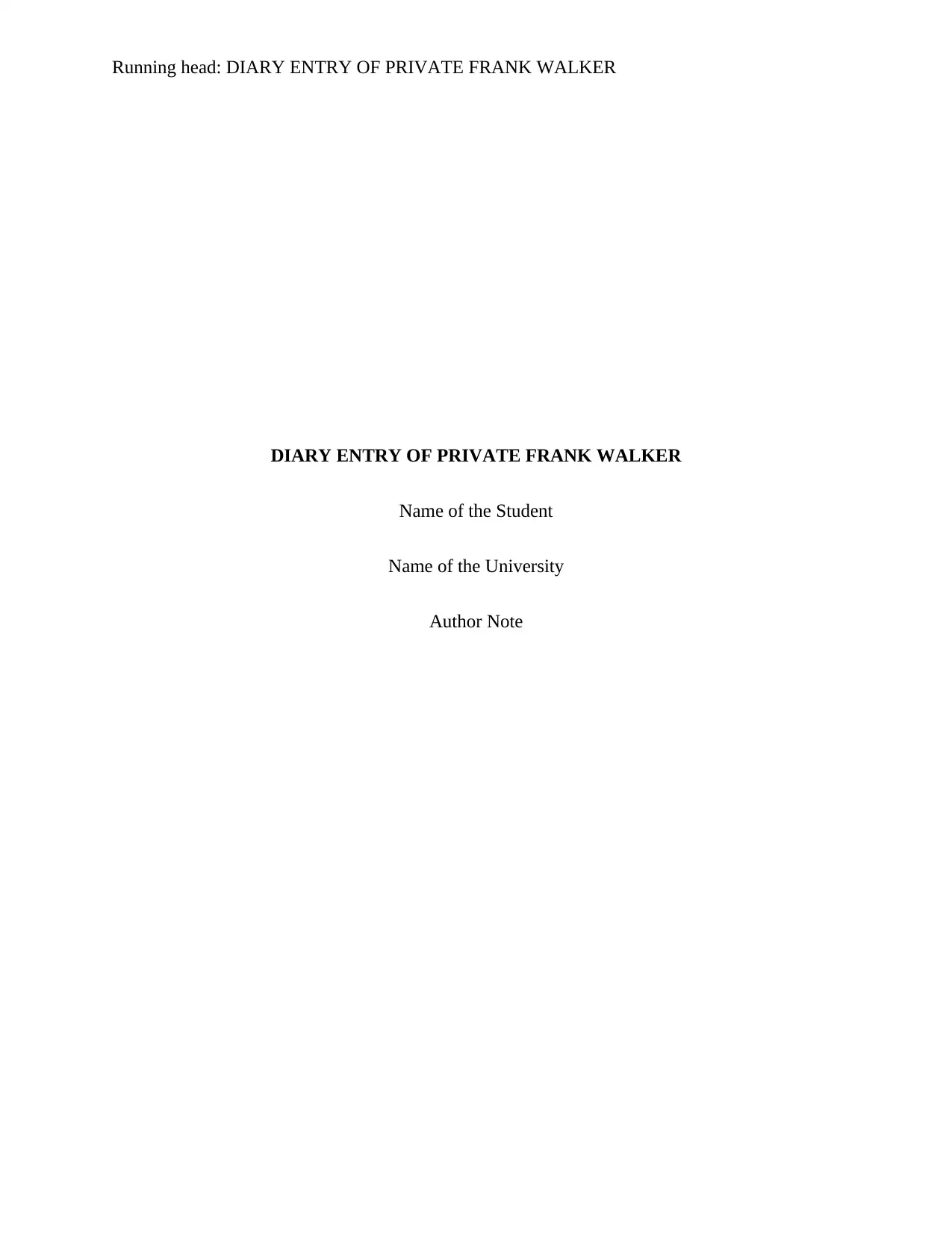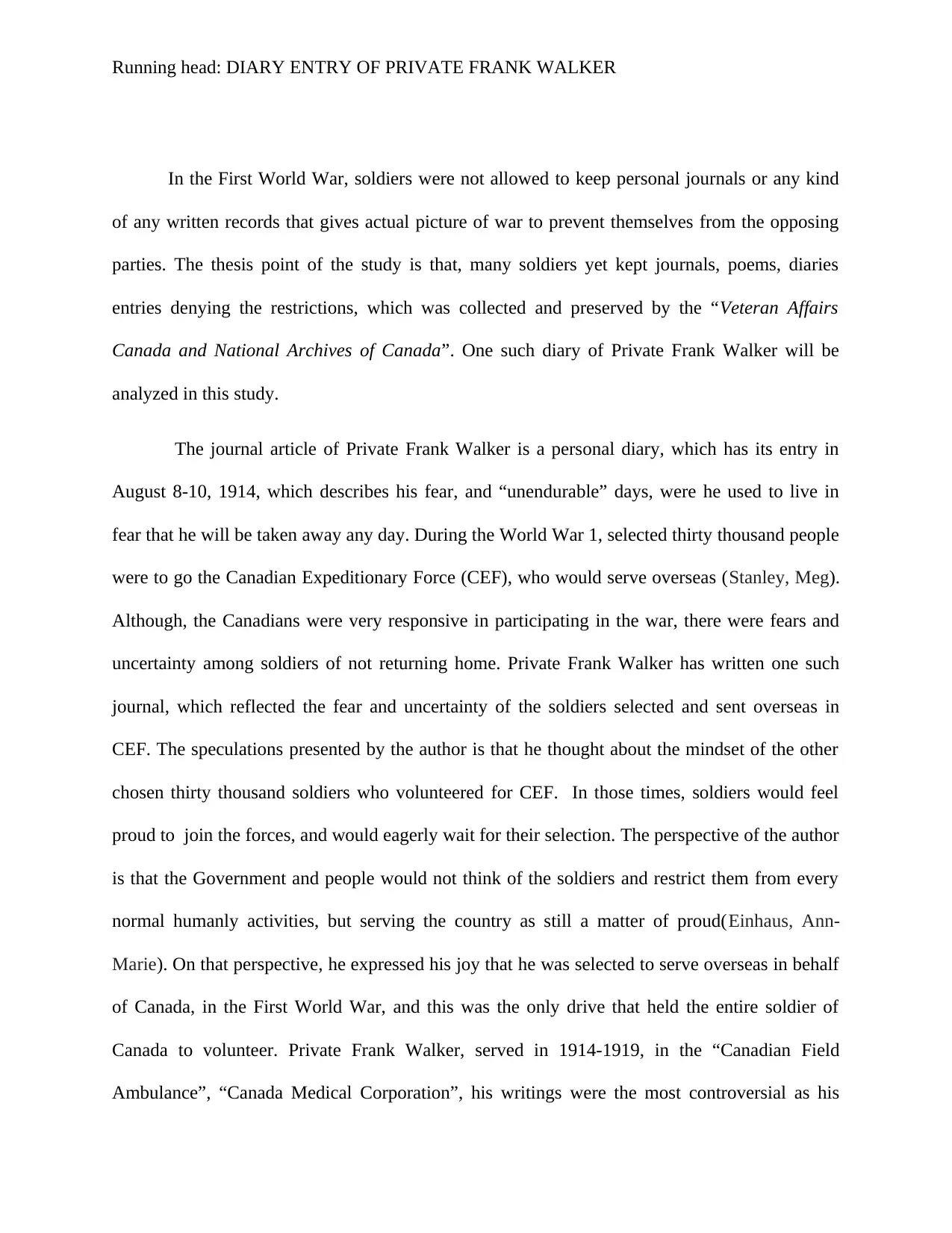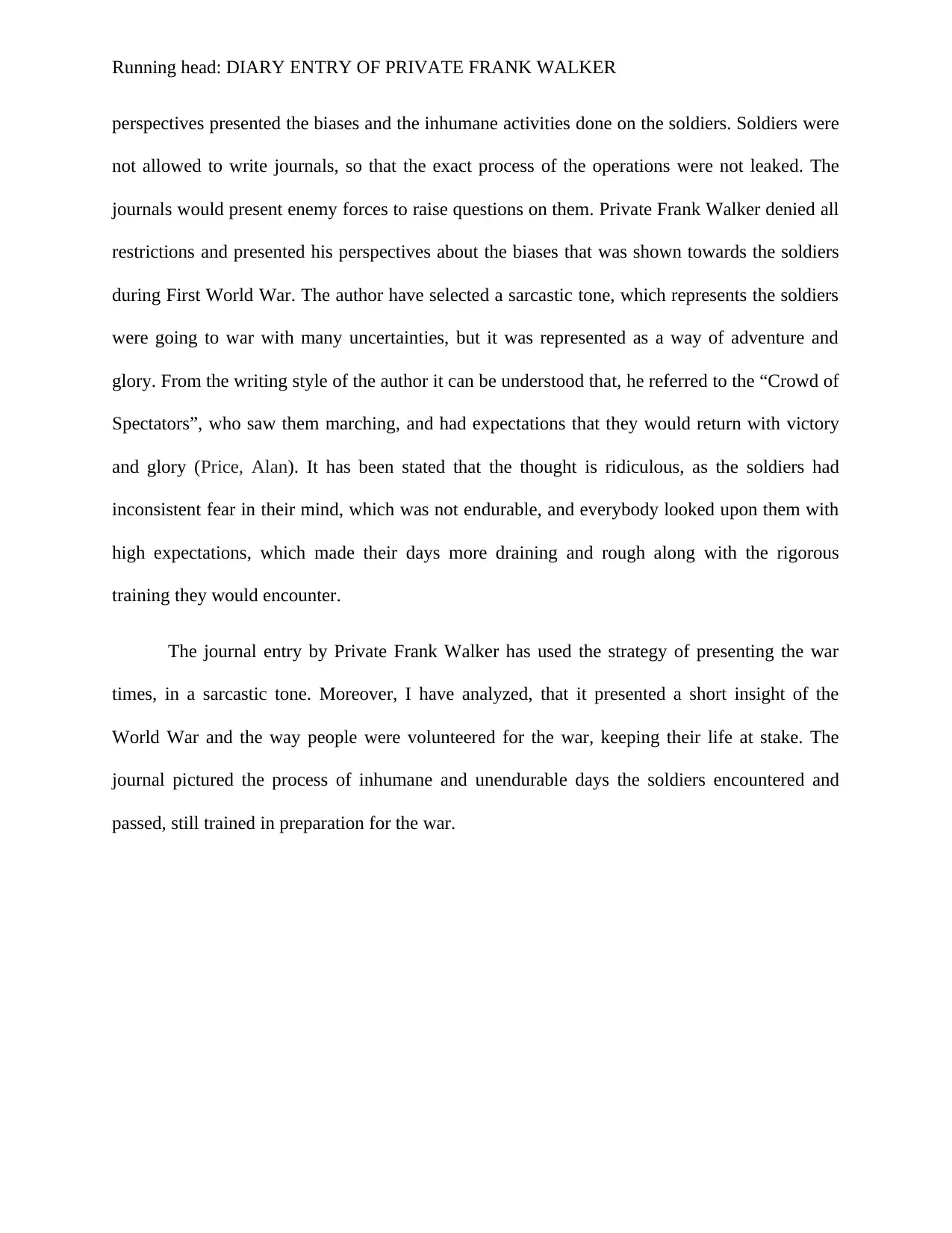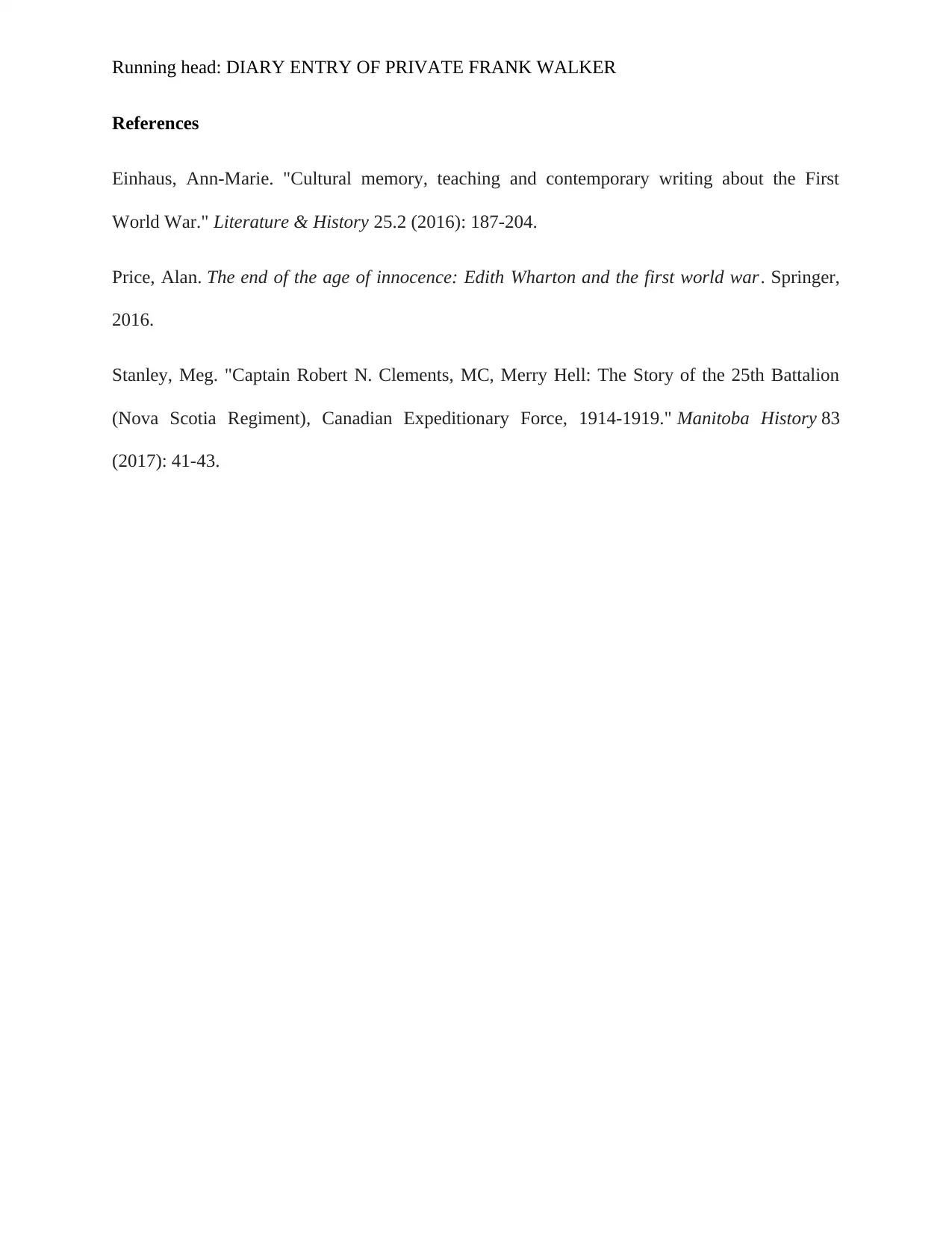Veteran Affairs Canada and National Archives of Canada
VerifiedAdded on 2022/08/26
|4
|777
|44
AI Summary
Contribute Materials
Your contribution can guide someone’s learning journey. Share your
documents today.

Running head: DIARY ENTRY OF PRIVATE FRANK WALKER
DIARY ENTRY OF PRIVATE FRANK WALKER
Name of the Student
Name of the University
Author Note
DIARY ENTRY OF PRIVATE FRANK WALKER
Name of the Student
Name of the University
Author Note
Secure Best Marks with AI Grader
Need help grading? Try our AI Grader for instant feedback on your assignments.

Running head: DIARY ENTRY OF PRIVATE FRANK WALKER
In the First World War, soldiers were not allowed to keep personal journals or any kind
of any written records that gives actual picture of war to prevent themselves from the opposing
parties. The thesis point of the study is that, many soldiers yet kept journals, poems, diaries
entries denying the restrictions, which was collected and preserved by the “Veteran Affairs
Canada and National Archives of Canada”. One such diary of Private Frank Walker will be
analyzed in this study.
The journal article of Private Frank Walker is a personal diary, which has its entry in
August 8-10, 1914, which describes his fear, and “unendurable” days, were he used to live in
fear that he will be taken away any day. During the World War 1, selected thirty thousand people
were to go the Canadian Expeditionary Force (CEF), who would serve overseas (Stanley, Meg).
Although, the Canadians were very responsive in participating in the war, there were fears and
uncertainty among soldiers of not returning home. Private Frank Walker has written one such
journal, which reflected the fear and uncertainty of the soldiers selected and sent overseas in
CEF. The speculations presented by the author is that he thought about the mindset of the other
chosen thirty thousand soldiers who volunteered for CEF. In those times, soldiers would feel
proud to join the forces, and would eagerly wait for their selection. The perspective of the author
is that the Government and people would not think of the soldiers and restrict them from every
normal humanly activities, but serving the country as still a matter of proud(Einhaus, Ann-
Marie). On that perspective, he expressed his joy that he was selected to serve overseas in behalf
of Canada, in the First World War, and this was the only drive that held the entire soldier of
Canada to volunteer. Private Frank Walker, served in 1914-1919, in the “Canadian Field
Ambulance”, “Canada Medical Corporation”, his writings were the most controversial as his
In the First World War, soldiers were not allowed to keep personal journals or any kind
of any written records that gives actual picture of war to prevent themselves from the opposing
parties. The thesis point of the study is that, many soldiers yet kept journals, poems, diaries
entries denying the restrictions, which was collected and preserved by the “Veteran Affairs
Canada and National Archives of Canada”. One such diary of Private Frank Walker will be
analyzed in this study.
The journal article of Private Frank Walker is a personal diary, which has its entry in
August 8-10, 1914, which describes his fear, and “unendurable” days, were he used to live in
fear that he will be taken away any day. During the World War 1, selected thirty thousand people
were to go the Canadian Expeditionary Force (CEF), who would serve overseas (Stanley, Meg).
Although, the Canadians were very responsive in participating in the war, there were fears and
uncertainty among soldiers of not returning home. Private Frank Walker has written one such
journal, which reflected the fear and uncertainty of the soldiers selected and sent overseas in
CEF. The speculations presented by the author is that he thought about the mindset of the other
chosen thirty thousand soldiers who volunteered for CEF. In those times, soldiers would feel
proud to join the forces, and would eagerly wait for their selection. The perspective of the author
is that the Government and people would not think of the soldiers and restrict them from every
normal humanly activities, but serving the country as still a matter of proud(Einhaus, Ann-
Marie). On that perspective, he expressed his joy that he was selected to serve overseas in behalf
of Canada, in the First World War, and this was the only drive that held the entire soldier of
Canada to volunteer. Private Frank Walker, served in 1914-1919, in the “Canadian Field
Ambulance”, “Canada Medical Corporation”, his writings were the most controversial as his

Running head: DIARY ENTRY OF PRIVATE FRANK WALKER
perspectives presented the biases and the inhumane activities done on the soldiers. Soldiers were
not allowed to write journals, so that the exact process of the operations were not leaked. The
journals would present enemy forces to raise questions on them. Private Frank Walker denied all
restrictions and presented his perspectives about the biases that was shown towards the soldiers
during First World War. The author have selected a sarcastic tone, which represents the soldiers
were going to war with many uncertainties, but it was represented as a way of adventure and
glory. From the writing style of the author it can be understood that, he referred to the “Crowd of
Spectators”, who saw them marching, and had expectations that they would return with victory
and glory (Price, Alan). It has been stated that the thought is ridiculous, as the soldiers had
inconsistent fear in their mind, which was not endurable, and everybody looked upon them with
high expectations, which made their days more draining and rough along with the rigorous
training they would encounter.
The journal entry by Private Frank Walker has used the strategy of presenting the war
times, in a sarcastic tone. Moreover, I have analyzed, that it presented a short insight of the
World War and the way people were volunteered for the war, keeping their life at stake. The
journal pictured the process of inhumane and unendurable days the soldiers encountered and
passed, still trained in preparation for the war.
perspectives presented the biases and the inhumane activities done on the soldiers. Soldiers were
not allowed to write journals, so that the exact process of the operations were not leaked. The
journals would present enemy forces to raise questions on them. Private Frank Walker denied all
restrictions and presented his perspectives about the biases that was shown towards the soldiers
during First World War. The author have selected a sarcastic tone, which represents the soldiers
were going to war with many uncertainties, but it was represented as a way of adventure and
glory. From the writing style of the author it can be understood that, he referred to the “Crowd of
Spectators”, who saw them marching, and had expectations that they would return with victory
and glory (Price, Alan). It has been stated that the thought is ridiculous, as the soldiers had
inconsistent fear in their mind, which was not endurable, and everybody looked upon them with
high expectations, which made their days more draining and rough along with the rigorous
training they would encounter.
The journal entry by Private Frank Walker has used the strategy of presenting the war
times, in a sarcastic tone. Moreover, I have analyzed, that it presented a short insight of the
World War and the way people were volunteered for the war, keeping their life at stake. The
journal pictured the process of inhumane and unendurable days the soldiers encountered and
passed, still trained in preparation for the war.

Running head: DIARY ENTRY OF PRIVATE FRANK WALKER
References
Einhaus, Ann-Marie. "Cultural memory, teaching and contemporary writing about the First
World War." Literature & History 25.2 (2016): 187-204.
Price, Alan. The end of the age of innocence: Edith Wharton and the first world war. Springer,
2016.
Stanley, Meg. "Captain Robert N. Clements, MC, Merry Hell: The Story of the 25th Battalion
(Nova Scotia Regiment), Canadian Expeditionary Force, 1914-1919." Manitoba History 83
(2017): 41-43.
References
Einhaus, Ann-Marie. "Cultural memory, teaching and contemporary writing about the First
World War." Literature & History 25.2 (2016): 187-204.
Price, Alan. The end of the age of innocence: Edith Wharton and the first world war. Springer,
2016.
Stanley, Meg. "Captain Robert N. Clements, MC, Merry Hell: The Story of the 25th Battalion
(Nova Scotia Regiment), Canadian Expeditionary Force, 1914-1919." Manitoba History 83
(2017): 41-43.
1 out of 4
Your All-in-One AI-Powered Toolkit for Academic Success.
+13062052269
info@desklib.com
Available 24*7 on WhatsApp / Email
![[object Object]](/_next/static/media/star-bottom.7253800d.svg)
Unlock your academic potential
© 2024 | Zucol Services PVT LTD | All rights reserved.